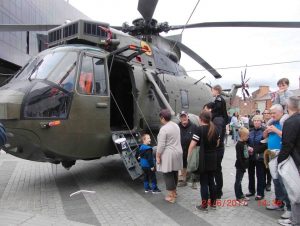Since 2009 Armed Forces Day celebrations have taken place in June across the UK. Each year a different city hosts the national event. Local authorities play a primary role in organising and funding these events. Schools and community organisations are encouraged to take part.
Outreach events are one part of a concerted effort to build public support for the military. The civil-military partnerships created under the Armed Forces Covenant are another. Many public authorities and organisations have now pledged to encourage public support of the military.
Recruitment stalls with military vehicles or weapons are common in local public spaces. Major events such as the 2012 Olympics and too-level football matches increasingly have an armed forces presence.
Why is this a problem?
While the military have become more visible through events such as Armed Forces Day, other recent developments are harder to see. Through armed forces partnerships with public authorities, business and other organisations, support for the military is becoming further embedded into wider society.
Local authorities support Armed Forces Day, and other events such as Reserves Day and recruitment displays, to fulfil their commitments under the Armed Forces Community Covenant. Many businesses, charities and community organisations have pledged support through the Armed Forces Corporate Covenant. While the stated aim of the Covenant is to remove disadvantage for serving members of the armed forces in accessing services, and to facilitate employees to be reservists, the Covenants also promote the military as an institution and as a career option.
As military action has become more controversial and recruits numbers have fallen, the armed forces have had to reach further into civil society to maintain public support.
Outreach events display an uncritical acceptance of military approaches and portray war-making as entertainment. Many Armed Forces Day events are marketed as ‘family fun’, without acknowledging the negative consequences of war. Public displays of weapons and military vehicles are used to promote the armed forces as a career to children.
Schools are encouraged to show support on Armed Forces Day by using assembly and curriculum resources which portray a sanitised image of military activities. Their promotional emphasis does not facilitate critical thinking among young people.
Answering questions
What is wrong with showing support for men and women in the armed forces?
Events such as Armed Forces Day aim to create public support for the military as an institution as well as recognising the service of those in the armed forces. Celebrating the military risks promoting an uncritical acceptance of its approaches at the expense of security approaches that aim to build long-term peace.
Why shouldn’t the council support these military events?
Local councils and other public bodies should not be obliged to create support for the military. These councils risk alienating parts of the local community by aligning themselves with the armed forces in a celebratory way. One part of the community is celebrated while services to others are cut and other public services are not given the same level of public recognition. Local councils should not be facilitating the unrealistic and sanitised view of military life portrayed in armed forces marketing.
Kids love military vehicles and weapons. What is wrong with them being on display?
Armed forces recruiters know that if they create an interest in a child from an early age, they are more likely to be able to recruit them later on. Public events provide the opportunity to develop this interest by presenting young people with exciting things like weapons and military vehicles and highly persuasive advertising.
What’s wrong with companies and charities showing support for cadets and Armed Forces Day?
Many organisations are being asked to support the armed forces and defence policy, such as the recruitment of reserves, which is unrelated to their actual business. Not only is this potentially divisive, it creates a privileged status for the armed forces that could be harmful to the long-term societal goals of democracy, equality and peace.
Isn’t it important for the general public to understand more about the work of the armed forces?
While it is important that individual service personnel, veterans and their families do not face hostility or disadvantage, public outreach activities are about far more than developing understanding. They serve to create acceptance of military approaches and to generate new recruits. It is easy to lose sight of the terrible effects of military conflict when armed intervention by the state is seen as normal.
Facts
Far from being just a reflection of respect for serving personnel, public support of the armed forces has intensified alongside the promotion of Armed Forces Day (1).
Armed Forces Day was established after the National Recognition of our Armed Forces report of 2008, which made many policy recommendations to make the armed forces feel “morally and materially supported” by society.
The Armed Forces Covenant was recognised in law in 2011. Every local authority in Great Britain has now signed an Armed Forces Community Covenant. Many partner organisations have also signed. As well as committing them to work towards removing disadvantage in access to housing, healthcare, education, and employment for the armed forces, it also pledges them to encourage support through public events such as Armed Forces Day. Many local authorities have appointed one or more Armed Forces Champions.
The Armed Forces Corporate Covenant has been signed by many hundreds of companies, charities and other organisations, including schools, colleges and universities, pledging workplace support of reservists, military spouses and veterans and support for cadet forces and Armed Forces Day.
1. The British Social Attitudes (29) report “Armed Forces: The UK’s Armed Forces: public support for the troops but not their missions?” (2012) stated that: “We have also found evidence from two different sources that people’s respect for the military is likely to have increased in recent years.”



